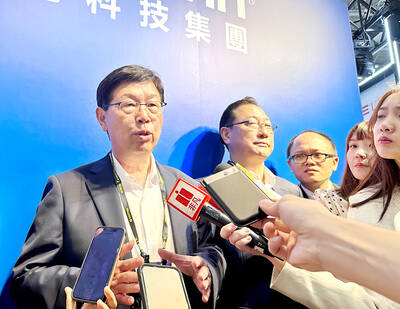Line Pay Money, the electronic payment service offered by LINE Biz+ Taiwan Ltd (連加網路) and iPass Corp (一卡通票證), ranked first in the nation in terms of number of users as of the end of October at 1.87 million, Financial Supervisory Commission data released on Tuesday showed.
The service provided by Jkopay Co (街口電子支付) was second at 1.11 million users, followed by that of AllPay Financial Information Service Co (歐付寶) with 851,417 users, the data showed.
However, transactions handled by Jkopay grew year-on-year to NT$1.12 billion (US$36.7 million) in October, compared with Line Pay Money’s NT$326 million via and AllPay’s NT$150 million, the data showed.
Jkopay also led in terms of transfers, an important function, at NT$801 million in October, followed by Line Pay Money’s NT$398 million and Allpay’s NT$42 million, the data showed.
The commission defines a transaction as being between a consumer and a store, while transfers are between consumers.
In Taiwan, Line Pay Money has fewer merchant partners than Jkopay, iPass senior assistant vice president Wang Jiun-ping (王俊平) said on Tuesday.
As LINE Biz+ Taiwan and iPass are forming partnerships with four regional peers to establish a cross-border payment alliance, more stores are expected to accept Line Pay Money next year, which would drive sales, Wang said.
In addition, LINE Biz+ Taiwan next year plans to partner with telecoms, insurance companies and medical institutions to attract more customers, Wang added.

Taiwan Transport and Storage Corp (TTS, 台灣通運倉儲) yesterday unveiled its first electric tractor unit — manufactured by Volvo Trucks — in a ceremony in Taipei, and said the unit would soon be used to transport cement produced by Taiwan Cement Corp (TCC, 台灣水泥). Both TTS and TCC belong to TCC International Holdings Ltd (台泥國際集團). With the electric tractor unit, the Taipei-based cement firm would become the first in Taiwan to use electric vehicles to transport construction materials. TTS chairman Koo Kung-yi (辜公怡), Volvo Trucks vice president of sales and marketing Johan Selven, TCC president Roman Cheng (程耀輝) and Taikoo Motors Group

Among the rows of vibrators, rubber torsos and leather harnesses at a Chinese sex toys exhibition in Shanghai this weekend, the beginnings of an artificial intelligence (AI)-driven shift in the industry quietly pulsed. China manufactures about 70 percent of the world’s sex toys, most of it the “hardware” on display at the fair — whether that be technicolor tentacled dildos or hyper-realistic personalized silicone dolls. Yet smart toys have been rising in popularity for some time. Many major European and US brands already offer tech-enhanced products that can enable long-distance love, monitor well-being and even bring people one step closer to

RECORD-BREAKING: TSMC’s net profit last quarter beat market expectations by expanding 8.9% and it was the best first-quarter profit in the chipmaker’s history Taiwan Semiconductor Manufacturing Co (TSMC, 台積電), which counts Nvidia Corp as a key customer, yesterday said that artificial intelligence (AI) server chip revenue is set to more than double this year from last year amid rising demand. The chipmaker expects the growth momentum to continue in the next five years with an annual compound growth rate of 50 percent, TSMC chief executive officer C.C. Wei (魏哲家) told investors yesterday. By 2028, AI chips’ contribution to revenue would climb to about 20 percent from a percentage in the low teens, Wei said. “Almost all the AI innovators are working with TSMC to address the

FUTURE PLANS: Although the electric vehicle market is getting more competitive, Hon Hai would stick to its goal of seizing a 5 percent share globally, Young Liu said Hon Hai Precision Industry Co (鴻海精密), a major iPhone assembler and supplier of artificial intelligence (AI) servers powered by Nvidia Corp’s chips, yesterday said it has introduced a rotating chief executive structure as part of the company’s efforts to cultivate future leaders and to enhance corporate governance. The 50-year-old contract electronics maker reported sizable revenue of NT$6.16 trillion (US$189.67 billion) last year. Hon Hai, also known as Foxconn Technology Group (富士康科技集團), has been under the control of one man almost since its inception. A rotating CEO system is a rarity among Taiwanese businesses. Hon Hai has given leaders of the company’s six